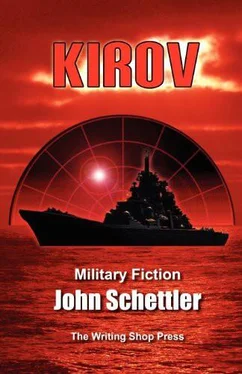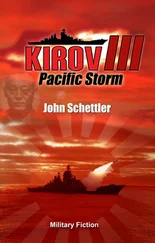John Schettler - Kirov
Здесь есть возможность читать онлайн «John Schettler - Kirov» весь текст электронной книги совершенно бесплатно (целиком полную версию без сокращений). В некоторых случаях можно слушать аудио, скачать через торрент в формате fb2 и присутствует краткое содержание. Жанр: Фантастика и фэнтези, Альтернативная история, на английском языке. Описание произведения, (предисловие) а так же отзывы посетителей доступны на портале библиотеки ЛибКат.
- Название:Kirov
- Автор:
- Жанр:
- Год:неизвестен
- ISBN:нет данных
- Рейтинг книги:5 / 5. Голосов: 1
-
Избранное:Добавить в избранное
- Отзывы:
-
Ваша оценка:
- 100
- 1
- 2
- 3
- 4
- 5
Kirov: краткое содержание, описание и аннотация
Предлагаем к чтению аннотацию, описание, краткое содержание или предисловие (зависит от того, что написал сам автор книги «Kirov»). Если вы не нашли необходимую информацию о книге — напишите в комментариях, мы постараемся отыскать её.
Kirov — читать онлайн бесплатно полную книгу (весь текст) целиком
Ниже представлен текст книги, разбитый по страницам. Система сохранения места последней прочитанной страницы, позволяет с удобством читать онлайн бесплатно книгу «Kirov», без необходимости каждый раз заново искать на чём Вы остановились. Поставьте закладку, и сможете в любой момент перейти на страницу, на которой закончили чтение.
Интервал:
Закладка:
“On the other hand,” said Volsky. “We are a naval fighting ship, and in this we have the power to considerably affect the conduct of the war at sea in the Atlantic if we choose to do so. But we must take things slowly, as the good doctor says. Should we fight here? For either side? If we do, then what do we propose to accomplish? We must give ourselves a little breathing room first, and time to think on these things. We could stay up here, in the cold Arctic sea. It is not much traveled, and we're fast enough to keep well ahead of anything that tries to run us down.”
“But there is not much room to maneuver here,” said Karpov, his mind sizing up their predicament from a tactical perspective. “The temptation to return home to Severomorsk will be very great, particularly when the winter comes in just a few months. This will be a very cruel place to live and fight.”
“Then we are faced with the prospect of breaking out into the Atlantic,” said the Admiral. “If we do so, we must move south. Word is only now just reaching the British Admiralty, as you suggest, Mister Fedorov. We are in a good position to transit the Denmark Strait. I think it best that we run on through and out into the Atlantic. With our knowledge of the history we can keep ahead of the enemy for some time. I do not think we will suffer the fate of Bismarck, hunted down and killed in just a few days time. Eventually we might work our way down into the South Atlantic and around the Cape of Good Hope into the Indian Ocean. Those waters are less traveled as well, and therefore less dangerous. Perhaps we could look for one of those little islands Doctor Zolkin was talking about. We have unlimited fuel in our nuclear reactors, but we must also keep our bellies full, yes? There is food aboard for thirty days or more, but eventually we will have to seek a landfall somewhere to replenish our stocks, and I do not think we can sail into any port nearby, yes? But for now, one thing at a time, let us get to the Denmark Strait and out into the North Atlantic. I'm tired of this cold gray place.”
“You propose we turn this ship into a simple convoy raider? Or worse, that we just slink off to the Indian Ocean?” Karpov tapped his fingernail on the table as he spoke, a habit he had when ready to argue a point.
“I would not underestimate the impact of a convoy raider,” said Fedorov, “assuming we did decide to oppose the British. The Germans had a few very successful sorties. Not every ship suffered Bismarck’s fate. The Admiral Scheer sunk well over 100,000 tons before making it safely back to a friendly port. Scharnhorst and Gneisenau fought well together, and there were others like the raider Atlantis and the armed commercial ship Penguin that made remarkable sorties.”
“Yes, and none of them mattered in the long run,” said Karpov. “We could cruise out into the middle of the Atlantic and become little more than a rock in the stream. They would simply divert convoys to the north and south of our position. And even if we pursued them, we could sink sixty merchant ships before our missile inventory would be expended, or even a hundred ships considering our deck guns, and it would all have little real impact on the war. We do not have a friendly port to go home to and replenish our ammunition. Every U-boat the Germans put to sea had no effect in the end, and they sank considerably more than a hundred ships, yes?”
“In that you are correct, sir. The U-boats sank nearly 2800 ships, accounting for about 70 % of all allied ship losses in the war.”
“And look what good it did them. No. If we want to have any real impact on events then we must work to bring about a situation where the power we have will be feared and respected by our enemies to a point where they may be willing to negotiate.”
“Negotiate? What do you mean, Captain?” asked the Admiral. “Do you expect Great Britain and the United States to surrender to this ship?”
Karpov hesitated, as if unwilling to reveal the full dimension of his thinking, but he continued. He glanced briefly at Orlov, but the Chief seemed lost in some inner muse, listening, but eyes averted as he fiddled with a folded pocket knife.
“This ship is not merely a tactical threat to the allied sea lanes. Our sea power does not rely solely on our limited ship-to-ship missile inventory, or our speed, or the fact that we can out think and out maneuver our enemies. We also pose a strategic threat, and this is irrefutable. You spoke earlier about certain weapons we possess, Admiral, weapons that we must not use, and weapons that we must allow no other to use as well. But understand this, the Americans, Germans, and Russians are even now in the early stages of their programs that will eventually lead to the development of the atomic bomb. The first detonation is only a few years away. If we use just a single warhead, and demonstrate the power that we have, our words may then speak as loud as our guns and missiles. And we do not have to destroy London or New York to make a demonstration of this power. A deserted rock like Bear Island will do just fine or, if you prefer a warmer clime, perhaps a deserted Caribbean island. The British and Americans will be our most formidable foe if we move into the Atlantic, and they are the ones we must persuade, to put it lightly.”
“I agree with the Captain,” said Orlov, stirring from his reverie. “With all due respect, Admiral, a demonstration such as he proposes would put fear into the hearts of our enemies, and give them pause before they set loose their navy or even think of hunting us down. For the moment we are an unknown, a ghost ship, and we have not done much harm aside from frightening off an old destroyer. But if we cruise out into the Atlantic, we will have a knife to the jugular of Britain's lifeline.” He flicked open his pocket knife, illustrating his point. “We have just given them a little shove on the shoulder, that is all, but if they push back? Fedorov is correct, the British will defend those convoy routes, the Royal Navy will fight, unless we convince them that to do so would be suicidal. But how to accomplish this?”
The Admiral thought deeply. “I believe I just might have a solution, gentlemen. That book you lent me was very enlightening, Mister Fedorov. I did some reading myself, and it seems to me there is an event of considerable significance looming on the near horizon, assuming this is 1941. And I think we are finally coming to an agreement on that. A small notation caught my eye beginning August 9, 1941. On that day President Roosevelt and Churchill meet on board the British battleship Prince of Wales and the heavy US cruiser Augusta in Argentia Bay, Newfoundland for the proclamation of the Atlantic Charter. If I am not mistaken, this agreement forms the basis of what became known as the United Nations in our day. Some believe it also underlies the foundation of NATO, the two demons that continue to haunt us in our day, yes? This being the case, we may find ourselves in the interesting position of being able to kill two birds with one stone, and influence both the past as well as the present we have come from.”
“Roosevelt and Churchill?” said Karpov, his eyes brightening. “Do you realize what we could do?”
“I realize all too well what we could do, what this ship is capable of doing if we chose to operate her aggressively,” said the Admiral. “But as you yourself argued so ably, Captain, we must be judicious, careful, and plan it well. And yes, words may speak as loud as our weapons in time. I will be relying on each and every one of you in the days ahead. But now hear this, gentlemen. My order concerning the use of nuclear weapons is this: There will be no deployment or use except on my expressed order. Yet I will consider what we have discussed here, and who knows,” he smiled. “Perhaps Mister Roosevelt and Churchill would like a front row seat to the theater. We must consider this situation carefully.”
Читать дальшеИнтервал:
Закладка:
Похожие книги на «Kirov»
Представляем Вашему вниманию похожие книги на «Kirov» списком для выбора. Мы отобрали схожую по названию и смыслу литературу в надежде предоставить читателям больше вариантов отыскать новые, интересные, ещё непрочитанные произведения.
Обсуждение, отзывы о книге «Kirov» и просто собственные мнения читателей. Оставьте ваши комментарии, напишите, что Вы думаете о произведении, его смысле или главных героях. Укажите что конкретно понравилось, а что нет, и почему Вы так считаете.












